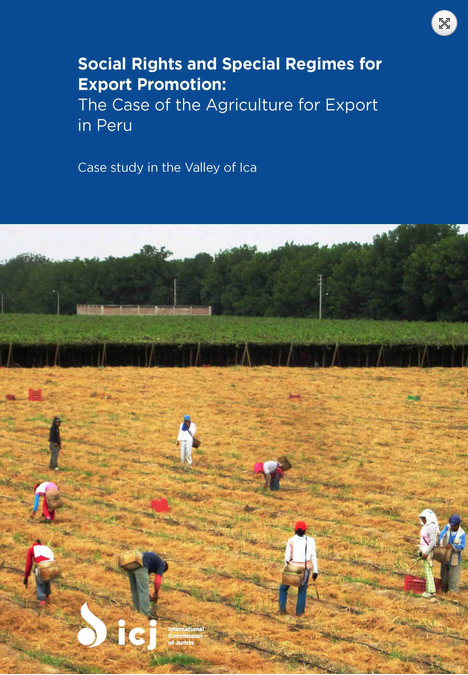New report on social rights and special regimes for export promotion in Peru
The International Commission of Jurists (ICJ) launches a new report on social rights and special regimes for export promotion. The report presents the findings, conclusions and recommendations of an ICJ observation mission on social rights in agriculture for export in the Ica Valley (south of Lima, Peru). The mission (29 April-7 May 2014) received the support of the Ica Human Rights Commission (CODEH-Ica)

The mission’s objective was to observe and verify on the ground the compliance with international standards regarding the protection of economic and social rights (labour, health and related rights) and the responsibility of the companies with respect to human rights, in the context of the operations of agro-export companies in the Valley of Ica.
The report concludes that the working conditions in agriculture for export in the Valley of Ica are deplorable and clearly constitute an example of precarious work which is not in accordance with international standards regarding the rights of workers and other social rights. Many of these situations can represent serious human rights violations.
The mission reached this conclusion after having listened to a large number of male and female workers, children, trade union leaders, labour experts, state officials and others, and after having analysed the information and analyses it was provided with or that it could collect independently.
With respect to the particular aim of this report with a special focus on the non-state business actors, the report concludes that the companies in the sector in general, be they large or small, lack a true understanding of corporate social responsibility (CSR) and human rights.
The mission has not been able to observe or gather information on any business policy or mechanism for the prevention of risks that affect their rights, or on mitigation or remedy plans. The principal local actors in human rights policy and CSR do not seem to have a full understanding of the issue or concrete plans in this regard either.
The report concludes with some recommendations for the Peruvian Government and other actors, including:
- The repeal or amendment of Law No. 27360 and the reestablishment of the general labour regime in the agriculture sector through a law passed by the Congress of the Republic.
- The prompt establishment and functioning of the National Superintendence for Labour Inspection – SUNAFIL and its effective monitoring work in the Region of Ica and other regions in the north of Peru, where the agro-export industry is important. The number of inspectors must be enough to cover the inspection needs in a region where tens of thousands of labourers work.
- It is necessary to establish, either attached to SUNAFIL or the Regional Labour Offices, suitable technical teams that are appropriately equipped with the technical instruments necessary to verify health conditions, including prevention, on the farms.
- The adoption of more severe measures, including far more effective and expeditious complaint procedures, in the face of anti-union actions and situations. Due to the insidious nature in which anti-union actions take place in this context, the mechanisms for detection or early warning should be renewed.
- The dedication of special resources and efforts to an adequate gathering and maintenance of information on work contracts – as well as renewed monitoring of the employer’s obligation to inform the competent authority of all the information related to the contract, its duration and conditions, among others.
- The adoption of measures to guarantee that companies faciliate the work of mothers with young children who need care facilities as well as to guarantee access, from the very fist day of work, to the benefits of the social security system.
The report also contains some recommendations for companies in the afro-export sector:
- The adoption of internal policies and procedures geared at assuring that the company’s operations respect human rights, including the labour rights of the workers in accordance with international standards.
- The publication or socialization on the internet of the internal measures adopted to remedy serious failures to comply with international standards for the protection of workers.
- Likewise, the mission urges companies to develop programmes to improve the standard of living in the communities which the majority of workers come from, and concentrate particularly on housing and essential public services.
- The report also contains recommendations addressed to trade unions, NGOs and other organizations of civil society, to the Inter-American system of protection of human rights and the international community.
Download the full report at Peru-Social Rights for Export Promotion-Publications-thematic report-2014-ENG
Source: Internation Commission of Jurists http://www.icj.org/
